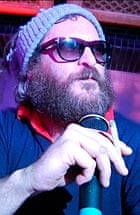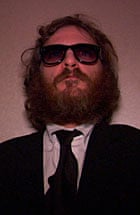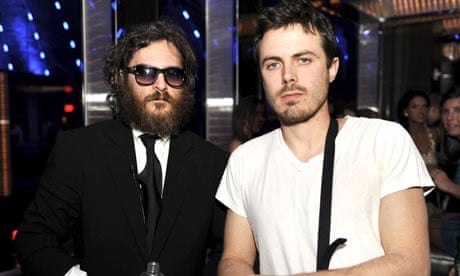The Sala Grande at the Venice film festival has seen some pretty big arrivals in its time, perhaps most famously in 2004 when the 17-strong delegation for The Merchant Of Venice left its star, Al Pacino, with nowhere to sit. But for I'm Still Here, the long-awaited documentary charting actor Joaquin Phoenix's very public meltdown of 2008, only the film's director, Casey Affleck, emerges to take his seat in the empty top-tier row. The crowd is pretty disappointed but sympathetic. After all, the posters outside show the once-lithe Phoenix looking bearded and wired, and as the candid, sometimes shocking film unfolds, they start to understand why he would want to stay away.
Later, though, rumours start to circulate that the film isn't quite everything it seems. One particular story, from a very reliable source, is especially interesting. It is claimed that some time before the film started, Phoenix arrived by vaporetto at the nearby Excelsior hotel. He was clean-shaven, smartly dressed, and had lost a lot of the weight he had been carrying for the last two years. Wearing shades, he was smuggled into the cinema shortly after the lights had dimmed. He sat with a friend, right at the back, and as he watched the film, "he laughed his ass off".
I'm Still Here has had tongues wagging for two years now, ever since the bedraggled star made an appearance at a Miami nightclub, rapped ineptly, and fell off the stage. It was reported that Affleck, Phoenix's brother-in-law, was working on a mockumentary that would chart the actor's attempt to leave Hollywood and break into the hip-hop world. Both parties strenuously denied that the doc was in any way mock, but the film does little to dispel that notion. In what looks like a deliberate attempt to pander to, and subvert, the media's thirst for celebrity scandals – and especially celebrity breakdown scandals – we see Phoenix courting the services of a shell-shocked P Diddy for his monotone ramblings, snort cocaine, order hookers from the internet and, famously, stun David Letterman's audience with a zombiefied guest slot. It simply looks too good to be true.
When he was put on the spot at the film's packed press conference, Affleck fielded questions with the agility of a master batsman. Asked directly how he would answer questions about the film's authenticity, about what was real and what was not real, he answered with a very telling remark. "Elliptically," he smiled. But as to whether the film is a hoax or not, he was standing firm. "I can tell you there is no hoax," he stated flatly. "It makes me think of Candid Camera or something."
When we meet later in the afternoon, the 35-year-old actor-director is friendly enough but very, very cautious. As well he might with two civil cases of sexual harassment hanging over his head, filed by the film's producer, Amanda White, and its cinematographer, Magdalena Gorka. He has his publicist with him at all times; unsurprisingly, the subject is never mentioned but Affleck is just as edgy about the movie, frequently hesitating and using phrases that, after an afternoon of TV interviews, already seem rote.
'What was interesting to me, for sure, was the idea of someone who was transitioning from being a famous, successful actor to being a musician'

"Joaquin and I had been talking about working together for a while," he offers, by way of starting the conversation, "and we were talking about doing something with me as a director and him as an actor for a while. But what was interesting to me, for sure, was the idea of someone who was transitioning from being a famous, successful actor to being a musician, trying to do something they'd never done. But like all stories, that was just the hanger. It was about other things; I was more excited about the human things that were onscreen."
So how did they decide when they were going to shoot and what they were going to shoot? Affleck squirms just a little in his canvas director's chair. "Errrm …" he begins. "Well, y'know, um, he and I are very close. We've been close for a while. So there was already a lot of time spent together. And it evolved organically. It began with me just picking up a little video camera no bigger than your tape recorder and starting to film him. Just trying to see what kind of personality was emerging when the camera was on. It's always so different, y'know: who someone is when they're talking to you and who they are when you point a light in their face."
Did Phoenix surprise you with how far he was willing to go?
"Yeah, he did."
Having indulged and danced with Affleck's "official" banter, I ask what Affleck actually thinks of Phoenix's music? Affleck senses the true agenda in the question; the tracks Phoenix records in the film are obviously terrible, so why would anyone want to document what's clearly a fool's mission? "I don't know," he says brightly. "Y'know … It's … some of it's good. He's a talented musician. He's been making music for a long time. Er, he's been doing music since I met him, which was almost 20 years ago, and some of it I've really liked. He's creative, he's smart, he's capable, he's hard working. So when he applies himself to other fields, other areas, he does well. Some of his music I liked, some of it I didn't like. I think he feels the same way."
What do you think the film says about Joaquin? "About Joaquin?"
He mulls over the question: "Er, he's driven. Any film like this is going to depend on the energy of the central characters, and it had to be an energy that would sustain the interest of an audience. And he has that kind of energy. And so, I think, that's what I found watching it. He was an exhilarating, compelling figure."
And he was happy with you filming him taking cocaine and ordering hookers?
He nods: "Uh-huh."
Yet those scenes seem the most staged; if they're real, how did you negotiate that?
'Once a little bit had been seen it was like: Well, now I'd better let everything be seen, so people understand. Does that make any sense?'

"I think people want … I think some people want a camera pointed at them all the time," he says, "and some people feel like, if something ugly has been seen on camera … Y'know, very often you'll hear someone who is reticent and when they have a microphone … once they say one thing, they start thinking, 'Oh, shit, that's not what I meant.' So they'll try to clarify it. And then they'll feel like, 'Oh, wait a minute, that didn't come out right,' and they'll say something else. And it's this downward spiral of trying to correct the last thing that they said … In this case, in the story of … In the story, I think there was something that needed to be expressed and that was actually, in fact, what gave me such … y'know … the ability to make such an intimate portrait. Y'know. Because there was something that wanted to come out, and once a little bit had been seen it was like, 'Well, now I'd better let everything be seen, so people understand, y'know …"
Affleck shifts in his seat again: "Does that make any sense?"
Well, no. But in a way it does. And then, with just seconds to go, I ask perhaps the most pertinent question of all: fake or not, is this his subject's attempt to destroy his celebrity image for good?
"I don't think so," he says. "I really don't. I mean, it's a good question, but …" There's a pause: "Let me ask you something. When will this article come out?"
The day after the film comes out in the UK, I reply.
Meanwhile, his publicist is signalling that there's time for one last question …
So is Joaquin definitely out of acting?
"No, I think he'll probably be acting again. Erm …"
He pauses again: "Y'know, I will feel a whole lot more comfortable sort of speaking more candidly and in more detail about the movie once people have seen it. Erm … it's important to me to have people watch the movie without reading an interview." He sighs: "I wish that all movies could be seen that way. Talk about it afterwards. But we have to publicise them. Y'know, in the future, maybe some day we can speak more candidly about the movie."
And when will that will be? "I don't know … Four weeks, three weeks from now?"
The interview ends right there, on that curious note. Exactly a week later, the New York Times announces that Joaquin Phoenix will return to the Letterman show for the first time since his controversial appearance. Then – frustratingly just after this whole piece had gone to press – Affleck finally cracks and confirms to the world that the film is a spoof.
Affleck's decision to spill the beans doesn't surprise me. After the film's premiere in Venice, on Monday of last week – just four days before its US premiere – he was clearly aching to reveal all, after a day spent squirming in the media spotlight. Perhaps if the film had screened without closing credits, he might have had a slightly easier time of it: after Affleck's directing credit came the biggest giveaway of all ("Written and produced by Casey Affleck and Joaquin Phoenix"), while the cast list that followed showed some interesting discrepancies, including the revelation that Phoenix's father is played by Tim Affleck, father to Casey and the rather better-known Ben.
But Affleck's timing is puzzling. The film has only sold to two territories outside the US: Australia, where it opened on Thursday, and the UK, where it opened yesterday, and public interest is bound to be reduced as a result of his admission. And there are still some unresolved issues hanging over this movie. Were the sexual harassment suits part of the stunt? If so, someone went to a lot of effort, since a fairly convincing set of legal documents does exist. There's also the question of Phoenix's state of mind. Even if this is a piece of performance art (Affleck still rejects the H-word), why did he do it? I'm Still Here has taken less than $100k at the US box office, suggesting that - real or not – the US public hasn't exactly been grabbed by the story.
Now all eyes are on Phoenix himself now, and his upcoming Letterman appearance on 22 September may bring us a little more clarity. Did Letterman know? And, to a lesser extent, how much did the film's "unwitting" co-stars (principally Ben Stiller and P Diddy) know? What started as the biggest movie scam since Borat has unravelled much faster than its makers, I'm sure, intended. The question now is: will Phoenix be able to rise from the murk with dignity intact? And, more pertinently, will anybody really care?



Comments (…)
Sign in or create your Guardian account to join the discussion